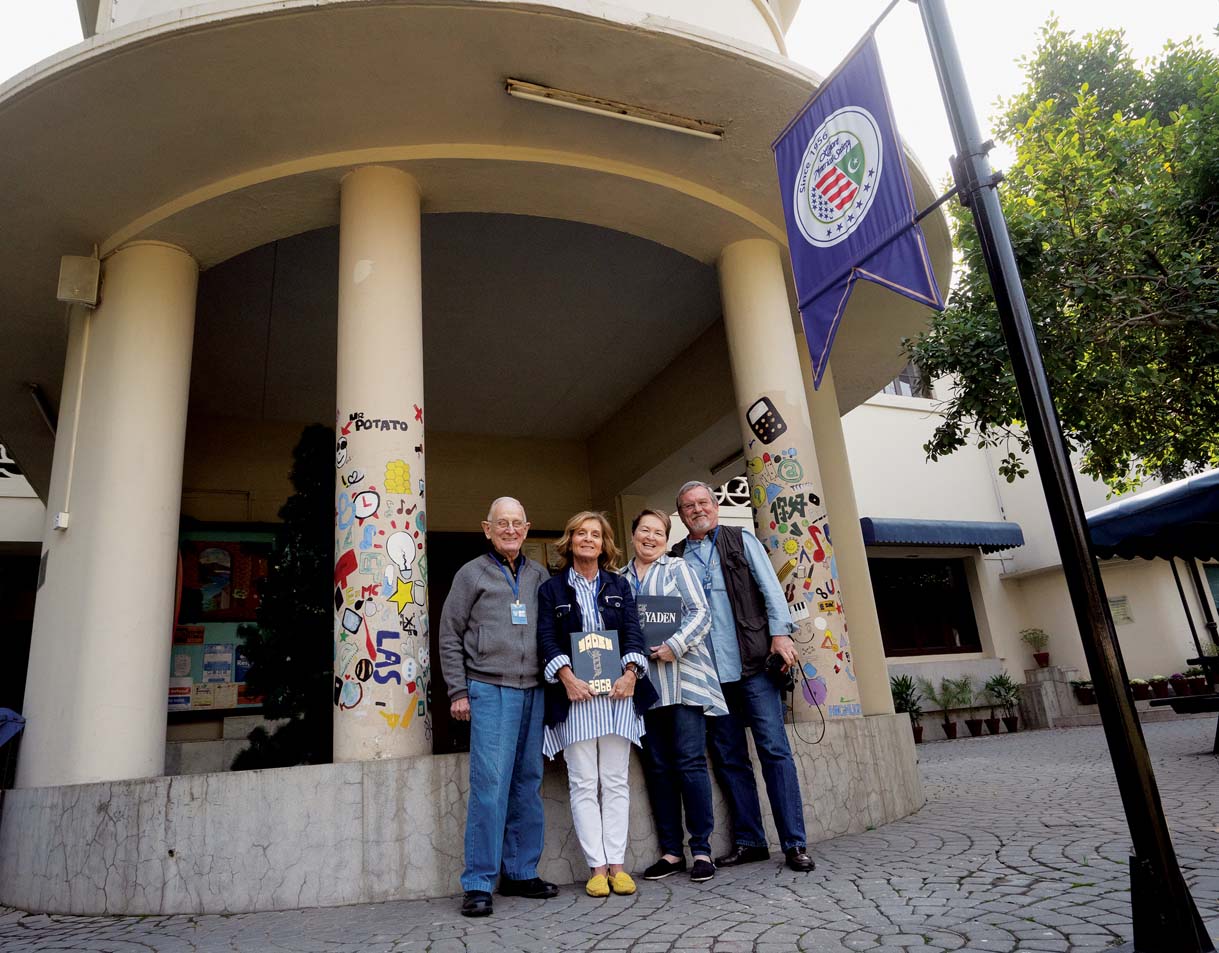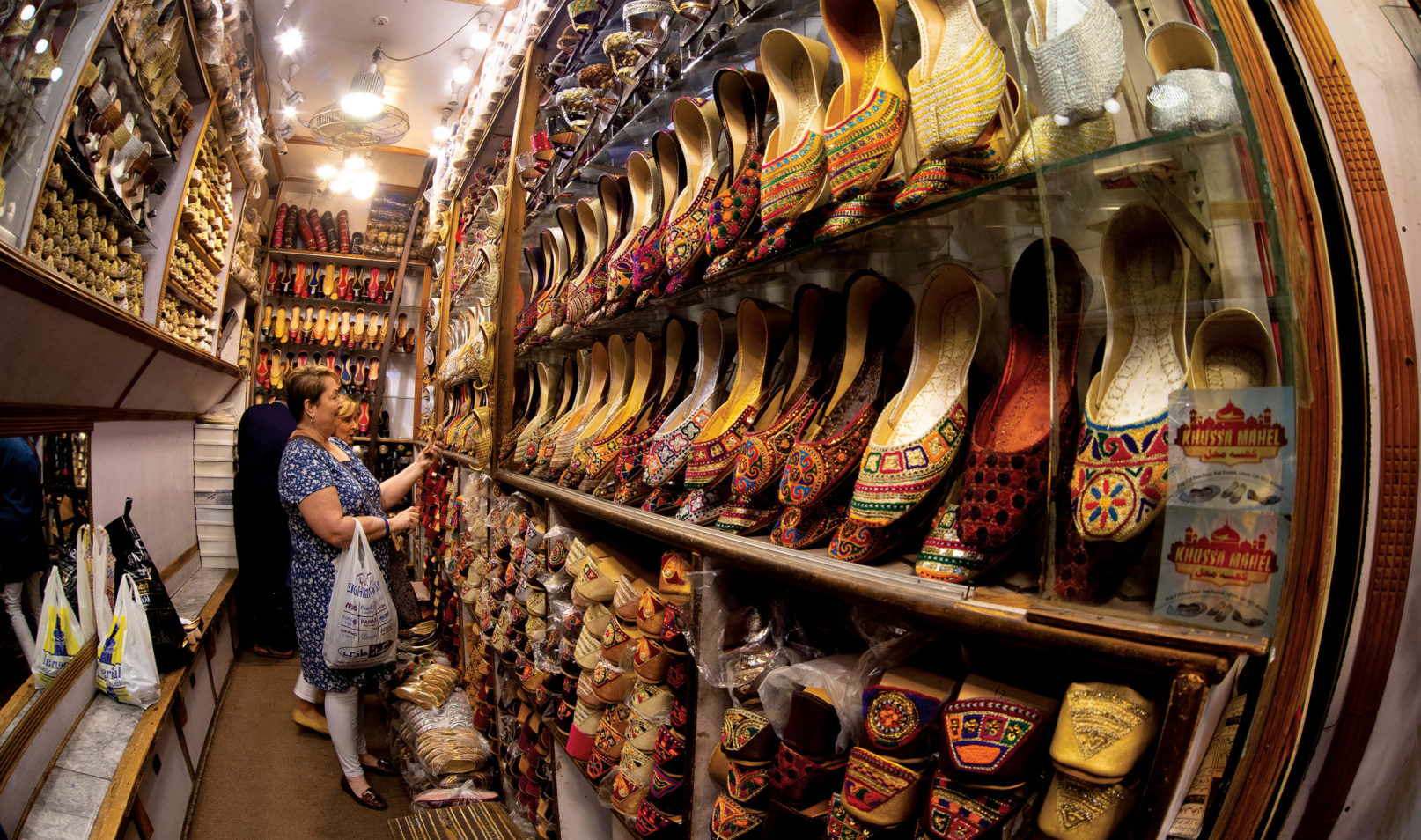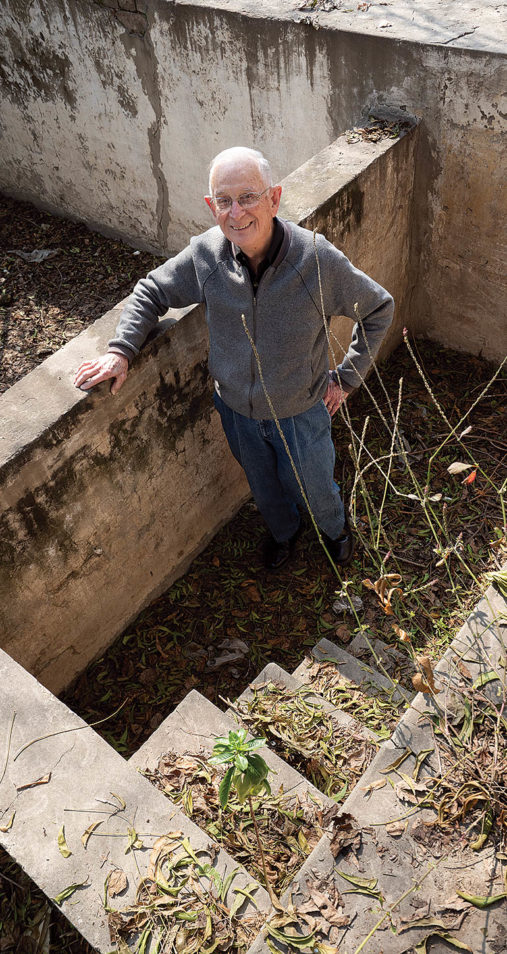Interview by Jantzen Haley, photography by Dave Hogan

If the opportunity arises to revisit the places where you spent your youth in the mission field more than 50 years later, you take it. Gordon Hogan, now 92 years old, and his three children, Beth James (’73), Dave Hogan (’78) and Julie Garner (’79), made a nine-day trip in early February 2020 to Lahore, Pakistan, visiting many of the places and people that marked their time as a missionary family in the 1960s. Dave, a talented photographer, shares the visit via images while Julie and Beth share their reflections in words.
Where all did you live growing up?
JULIE: I was three years old when my parents, Gordon and Jane Hogan, made the decision to go to India in 1960. They tell me we flew from New York to Germany, where we (and two other families) purchased three Volkswagen camper vans and drove all through the Holy Land following Paul’s missionary journeys recorded in the book of Acts.
BETH: When we arrived in Lahore, Pakistan, and found the visas we applied for to go to India had been denied, Dad flew to Karachi, Pakistan, and secured paperwork for us to stay in Lahore. We had driven overland from Germany for about four months. That in and of itself was a journey of a lifetime!
What is one story or distinctive memory from your childhood?
BETH: Most of my memories are of our family discovering new things together in new places. We flew to London, flew to Germany, and then drove to Pakistan. That journey of four months was rich with new places, sights and smells. Some were hardships — we were mired in thick mud, stuck in the middle of a stream, had tea with the king’s brother in Iran, turned over in a ditch in Turkey, mama was sick in a hospital, but the kindness of strangers made it a trip of a lifetime ending with living in Lahore. Watching my parents navigate the unknown with our family helped me learn to navigate life for the better.
JULIE: I was the one Hogan child who was the pickiest eater on the planet. My mother, having survived the Great Depression in her childhood, was not a fan of her youngest not eating everything on her plate. One night at supper she decided she was going to wait me out. Bless her heart. I was whining about how I hated green peas, which were stone cold at that point, to which my mother countered, “Millions of starving children in India would love to have those green peas on your plate.” As young as I was, even I saw the hilarity in her statement, and I suggested that the neighbor kids just outside our compound would want them just as much as the kids right across the border in India (14 miles away from our house in Lahore). I ate the green peas ... probably the last green peas ever to pass my lips!

How did your time in Pakistan shape who you are today?
JULIE: Our international childhood gave us a global perspective that I don’t think we would have acquired growing up in Pinellas Park, Florida. There is just something instantly connecting between folks who have traveled and/or lived overseas. I have maintained friendships from all these various seasons of my life because they are golden. I just recently found out that a woman, a few years my senior, who has lived and raised her family here in little old Dexter (Missouri), was raised in Peshawar, Pakistan. We made a date for tea and have become fast friends. We share something that no one else understands. When someone crosses my radar with any kind of international background, I make a beeline to go talk to them and share any common experiences. When others travel to remote areas, I follow their Facebook or Instagram feed with dedication, hoping for perhaps a glimpse of a city or experience of my youth.
But beyond the international experience, the influence of what this life my parents had chosen and we got to participate in, of making disciples half a world away, meant. How can that NOT shape who we are today? Any visiting missionary invited to speak where we worship here in Dexter/Bernie are like visiting royalty to me. I want to soak up what they have to say, what they were trying to do. Our Pakistan/Singapore lives have permanently colored everything I have ever done and will do in my life.
BETH: I definitely grew up with a foot in two worlds. Being 11 when arriving in another culture and transitioning to an 18-year-old missionary kid was definitely impactful. I don’t think I realized it so much when growing up there — that our life was different than anyone else. But virtually growing up overseas in the ’60s, you were very cut off from those in the U.S. It took two weeks to get an airgram (a letter on a prepaid folded sheet) and longer for anything else. Packages came a few times; we had no telephone; and of course computers were not around! Telegrams were sent if we needed to know something immediately. We came to view those as sad or bad news. I attended an all-girls school and was the only foreign student. It was taught in English. My last year I transferred to the Lahore American School to get credits needed for college entrance. It was coed American students, diplomat kids, oil workers, etc. with very small classes (there were seven seniors). All of these factors made me see we had a different life than most of my college friends. We were exposed to many different cultures in Lahore, which broadens your worldview and increases your knowledge of those around you.
Which places did you visit in your recent trip, and what was it like to see those places and people today?
BETH: It took a few days to get our bearings because Lahore has grown so much since we left. It was a city of 1 million when we lived there, now it is about 12 million. The cultural aspects have not changed much, but the infrastructure has. Many large roads, large mall complexes and tall buildings exist now. When we lived there most buildings were from the era of British rule in India, since it was all one country until 1947. We toured some of the historic sites such as the Badshahi Mosque, Lahore Fort and some of the gardens in the area. We searched for old addresses of places we had lived and found two of them.
JULIE: Finding the property at Siddiqui Street (now Abu Bakar in New Garden Town) where we lived the longest was monumental. It took a dedicated driver to finally locate the property. The compound wall was still there, but the house was gone. This property housed our family in one half of the house and the worship area in the other half. The floor where we worshipped had bright red, waxed floors. All of this was gone. We took pictures of where it used to be and compared them to pictures of us in that very place. When people use the word “bittersweet,” that word encapsulated our experience standing in the midst of that compound. We only wish our mom could have joined us there.
BETH: We spent all day Sunday with the church family in Lahore and again on Thursday evening as we gathered in a tiny home of one of the local families for tea and cookies and a time to share Scripture. We sat in chairs my dad had purchased for worship in the ’60s, and he preached from the old lectern he had someone build during our early years in Lahore. All of us cried tears of joy being with the brethren. The work had been a part of our lives so many years before, and is still alive and thriving and so dear to our hearts. We visited our old schools and had tea time with two of my Pakistani school mates. We had a huge spread of food and visited for several hours after having been separated for 52 years. I thought it might be awkward after all these years as adults ... also separated by different faiths, but we picked up, filling in the gaps of our distance and years with laughter and tears.
JULIE: On our Sunday in Lahore, Dad delivered the message and Asghar Ali translated, just like back in the day. Dad had taught and baptized Asghar in 1962. He has remained faithfully carrying on all these years, preaching the word of God. Seeing and hugging Asghar again after all these years was heart bursting. Seeing Asghar and my dad together again was heart melting. As one of Dad’s girls meeting one of Asghar’s girls — heart-rending.

What are the most significant changes to the places, the people, the culture?
JULIE: The walls. There are now walls around every significant building in Lahore — walls with massive metal gates and gun-toting guards. You must make an appointment to visit many places. We had trouble recognizing places because the walls obscured views of the buildings. Security checkpoints were set up in various parts of Lahore. None of this existed in the ’60s when we lived there. As we drove into our hotel compound several times a day, the gate would open, the security guards would check under the hood and in the trunk of the car. America and Americans were loved in the ’60s. Now there is a “going-to-keep-you-at-arms-length” for a minute ... and then it was just like when we were kids. The everyday Pakistani was curious about these foreigners visiting their city. First question — where are you from? Next question — do you like Pakistan? Our answer was always a resounding “we love Pakistan!” Instant friends.
BETH: The most significant changes are to the city infrastructure. Because of the sheer growth of the population it has had to keep up. Many of the older sections have been torn down and built up. Ox carts and horse-drawn tongas have been exchanged for many more cars. Cell phones are everywhere, and people constantly stopped us to take photos with them. We saw no foreign activity anywhere, which was unusual for us. Travelers of many nationalities used to be present. Interaction between males and females was much more prevalent. Lahore in our days was very segregated between males and females. In those days, women wore the burka and stayed at home. Now all are out and interacting, and some have public jobs — unheard of when I was a kid. Stores have ready-made clothes, as opposed to selecting material and having everything stitched from a picture. Many stores also have fixed prices for things — as a child we bargained for every purchase. Also many food products are available now in chain grocery stores. As a kid we bought meat fresh from an on-the-street butcher, fresh vegetables and fruit. Milk used to come directly from a local seller that bought it from a farmer and watered down a few times and then sold to us, or sometimes the water buffalo was milked at our house as they walked from house to house. We also had someone who brought fresh ground peanut butter door to door on a donkey. They spooned it out of a larger vat into your own container and sold it by weight. It was not homogenized or pasteurized or very smooth and had to be stirred before every use because of the oil collecting on the top, but it was good! We made our own mayonnaise, marshmallows and potato chips. Now Lays and other companies are in local stores.

What has remained largely the same?
JULIE: It is still very much a male-dominated Muslim controlled country. There are people everywhere. As women, Beth and I knew when to cover our heads with dupattas (head scarves). Cricket is still THE sport. Glass bangles are still very popular. Eat only with your right hand. The traffic is horrendous. You had to just learn to not look out of the car window. Even with signs that said fixed price, you could still bargain and get the “special price for foreign visitors.” My overall takeaway within an hour of being back in Lahore is that the hospitality of Pakistanis is unparalleled. Wherever we went, in the finest areas and the poorest areas, we were sincerely welcomed, always. It was a humbling nine days that will forever be etched in my heart.
BETH: The Muslim culture is still very much the driving force, but at least in the major cities like Lahore, the people seem more relaxed about the rules. Even at the active Badshahi Mosque, there was no one monitoring dress code, head covering or behavior, like it is in other cities where we have traveled. The people in Lahore have always been friendly, but this trip we were overwhelmed with how kind people were to us as travelers. Everywhere we stopped people introduced themselves, many times mentioning relatives in the U.S. and wanting to help us in some way. At a shopping area a family stopped as we were having trouble with our loaner phone, gave us their Uber and arranged to send a car for us to eat with them the next night. We went and had a nice meal together and have met their relatives here in Oklahoma since returning.
What does it mean to you to be able to revisit these locations with your father 52 years later?
JULIE: As they say in the MasterCard commercials: Priceless. Who gets this kind of gift given them? To go back to their childhood home in Pakistan with their 92-year-old Dad and brother and sister? It was truly priceless. I would do it again in a heartbeat.
BETH: Visiting in Lahore with my Dad and siblings meant we had come full circle. The days living in Lahore were during my formative years growing up and helped shape attitudes and feelings toward others and experiences. I think all this early traveling made our time in Greece when we served as directors of HUG and as faculty at HUF and HUA especially meaningful. We pulled together and worked to learn about new and different things, including a language and customs very different than our own. Now we are grown and have families of our own who will never really be able to know what that life was like, but together we were able to feel transported back to a very important place and time in our lives and see how it has changed and is yet so familiar. The only part missing was our mama, who passed away four years ago. Having her with us would have made our hearts complete.
Were there any signs or restrictions regarding coronavirus as you were traveling?
JULIE: Fortunately, we were traveling right before this impacted most international travel. I think the only restrictions were travel to and from China at the time. When we arrived at the airport in Lahore, there were three uniformed men scanning all incoming passengers with forehead scanner thermometers. They did it so rapidly, I wondered how they could even read one before scanning the next person. But perhaps they were proficient at it!
BETH: They took our temperature when we arrived at the airport, and those people were wearing masks. We didn’t see anything else related to it except for a few signs in a couple of public places, but definitely no social distancing going on in that incredibly crowded city. Stores were full and busy, and traffic was heavy.
[Best_Wordpress_Gallery id="33" gal_title="Back to Pakistan"]